Taliban Imposes Harsh Restrictions on Afghan Women's Behavior
Taliban issues new rules severely limiting women's freedoms in Afghanistan. Restrictions cover appearance, speech, and movement, sparking outrage and concern among Afghan women and the international community.

The Taliban regime in Afghanistan has recently implemented a series of stringent regulations targeting women's behavior and appearance. These new rules, outlined in a comprehensive 114-page document, have sparked significant concern among Afghan citizens and the international community.
According to the new directives, adult women are prohibited from looking at unfamiliar men and must cover their faces "to avoid temptation." Additionally, women are instructed to refrain from speaking in the presence of men who are not their husbands or relatives, both in public and within their homes.

These restrictions extend to various aspects of daily life. Women are required to cover their entire bodies when in public, and their clothing must not be thin, tight, or short. The rules also prohibit women from singing or reciting the Koran in public spaces.
"They've essentially created a massive cage for us called Afghanistan. I'm very concerned about what lies ahead."
The impact of these regulations on Afghan women's lives is profound. Since the Taliban's return to power in August 2021, women have faced numerous restrictions, including bans on working with aid agencies, entering parks, and traveling without a male guardian. Girls over the age of 12 have been excluded from education, significantly impacting the future of Afghanistan's young population.
It's worth noting that Afghanistan has one of the youngest populations globally, with a median age of 18.4 years. The literacy rate for women in the country is approximately 30%, a figure that may further decline under these new restrictions.
The international community has expressed deep concern over these developments. The United Nations has repeatedly condemned the Taliban's treatment of women, highlighting the regime's contribution to a climate of fear and intimidation among Afghans.

These new rules are reminiscent of the Taliban's previous rule from 1996 to 2001, during which they imposed similarly strict interpretations of Islamic law. However, the current situation is unfolding in a different global context, with Afghanistan's population now at approximately 38 million and the country facing significant economic challenges.
The Taliban's government, which is not officially recognized by any country, has been accused of human rights violations by numerous international organizations. As Afghanistan grapples with these new restrictions, the country's rich cultural heritage, dating back over 2,000 years, stands in stark contrast to the current regime's policies.
As the situation continues to evolve, the international community faces the challenge of addressing these human rights concerns while navigating complex geopolitical realities in a country that has been in a state of conflict for over four decades.


































